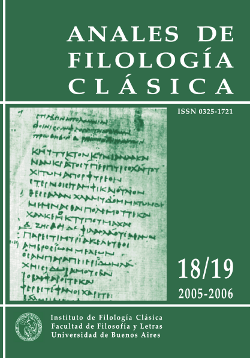El fin de Príamo en la <i>Eneida</i> y la expresión de la impiedad
Palabras clave:
impiedad, sacrilegio, sacrificio, inversión del sentido, desacralización, ungodliness, sacrilege, sacrifice, inversion of the meaning, desecration
Resumen
Es conveniente estudiar la religión romana desde la perspectiva de la impiedad para comprender el sentir de los antiguos. Virgilio se preocupa (A. II, 506‐558) por subrayar la impiedad con que son abatidos por Pirro, junto a un altar, el anciano rey Príamo y su hijo Polites. Sus muertes son sacrílegas: el lugar de la veneración se ha transformado en lugar de la matanza. Puede aducirse que se vuelven verdaderos sacrificios humanos. Si es así, se da una inversión del significado etimológico del término sacrificium, que aquí designa un acto de barbarie destinado a desacralizar al ser que lo ejecuta.It is convenient to study the Roman religion from the perspective of the ungodliness to understand the feeling of the ancient Romans. Virgil (A. II, 506‐ 558) emphasizes the ungodliness with which the old king Priam and his son Polites are brought down by Pyrrhus, close to an altar. Those deaths are sacrilegious: the place of the worshiping has been turned into a spot for slaughter. It can be argued that they become real human sacrifices. If so, there is an inversion of the etymological meaning of the term sacrificium, which in that case would designate an act of barbarism destined to desecrate the one who carries it out.Descargas
La descarga de datos todavía no está disponible.
Cómo citar
Mainero, J. (1). El fin de Príamo en la <i>Eneida</i> y la expresión de la impiedad. Anales De Filología Clásica, (18-19), 41-59. https://doi.org/10.34096/afc.v0i18-19.437
Número
Sección
Artículos
Los autores/as que publiquen en esta revista aceptan las siguientes condiciones:
- Los autores/as conservan los derechos de autor y ceden a la revista el derecho de la primera publicación, con el trabajo registrado con la licencia de Atribución-CompartirIgual 4.0 Internacional (CC-BY-SA 4.0) de Creative Commons, que permite el uso comercial de la obra y de las posibles obras derivadas, la distribución de las cuales se debe hacer con una licencia igual a la que regula la obra original.
- Los autores/as pueden realizar otros acuerdos contractuales independientes y adicionales para la distribución no exclusiva de la versión del artículo publicado en esta revista (p. ej., incluirlo en un repositorio institucional o publicarlo en un libro) siempre que indiquen claramente que el trabajo se publicó por primera vez en esta revista.
- Se permite y recomienda a los autores/as a publicar su trabajo en Internet (por ejemplo en páginas institucionales o personales) antes y durante el proceso de revisión y publicación, ya que puede conducir a intercambios productivos y a una mayor y más rápida difusión del trabajo publicado (vea The Effect of Open Access).
En ningún momento se cobrará monto alguno al autor por la publicación en esta revista.







